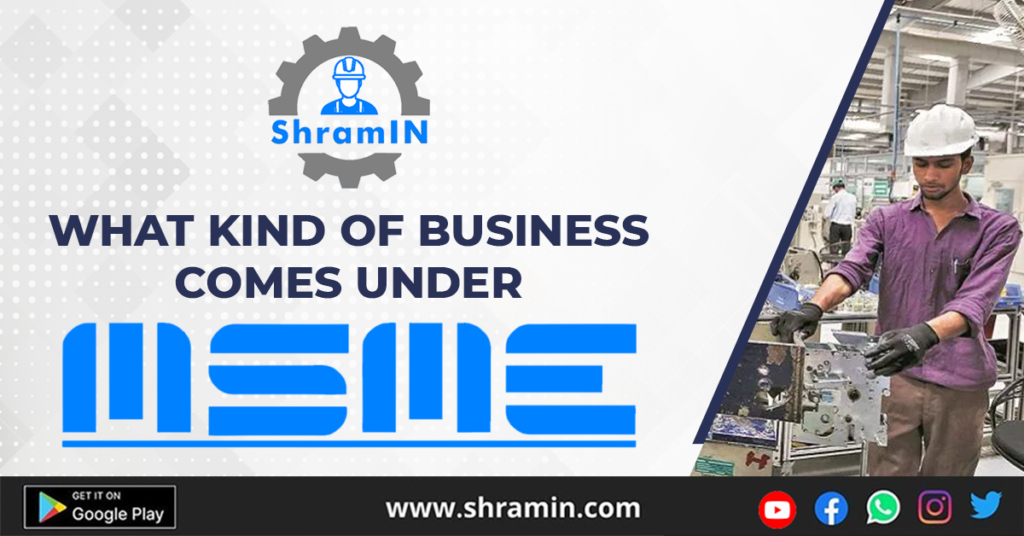Introduction
Micro, Small and Medium Enterprise (MSME) is a branch of the Indian Government that substantially manages the socio-economic development of the nation. It was introduced in agreement with the Micro, Small and Medium Enterprises Development (MSMED) Act, 2006, under which the Ministry of MSME owns and manages MSME. And it facilitates and develops the enterprises that are engaged in manufacturing, processing or preserving goods and commodities.
In a country like India, MSME plays a crucial role in developing the country. MSME contributes about 29% to 30% in Gross Domestic Product (GDP) through its trade. According to the report, India has around 6.3 Crore MSME, the maximum comes under the microenterprise bracket. Micro enterprises exist more in rural regions than urban ones, which helps rural and backward areas to industrialize.

Businesses Under MSME
Earlier according to the 2006 MSMED Act, MSME only included two kinds of industries, manufacturing and service. Trading was excluded from the scheme, as it works as an intermediary between business and customer. But in July 2021, Union Minister of MSMEs, Nitin Gadkari, announced to include retail and wholesale traders in MSME. The revised guidelines can impact around 2.5 cr traders.
Manufacturing Industries:
Enterprises involved in producing or manufacturing goods that are mentioned in the First Schedule of Development and Regulation Act, 1951. And defined as per Plant and Machinery investment. For Example:
Textile Industry:
This industry is majorly concerned with the production and design of fabric, yarn and clothing. The raw material may come from the chemical industry. Work with cotton, jute, wool or sill to make yarn, hosiery and rope.
Chemical Industries:
Industries comprise the companies that produce industrial chemicals. It involves categories like inorganic and organic chemicals, synthetic resins, plastics, textile auxiliaries, etc.
Electrical Equipment:
Industries that manufacture electrical items like electrical motors, fans, finances, wires and cables, etc.
There are various kinds of manufacturing industries in India that are not mentioned above like, metallurgical industries, drugs and pharmaceuticals, fuels, leather industry, etc.
Service Industry:
After manufacturing, MSME also holds service industries, which is also equally important for the country’s economy. It includes the enterprise that gets involved in providing or rendering services. The maximum population works under this category of industry.
Some Examples:
- Health care and Hospitality:
- A business that involves medical professionals, organisations, health care workers who provide medical care to the people who are in need.
- And hospitality involves various services which mainly provide service for guests satisfaction. This includes housekeeping, catering, hotel manager or receptionist, etc.
Education Industry:
An industry that comprises organisations that focus on education or skill development. It includes schools, colleges, universities and training sectors.
IT Sector:
Currently the most popular industry. It comprises various services that help organisations to manage, create and deliver information. Mostly the services it includes are software development, consulting, outsourcing (BPO), management services, system integration, etc.
And various other businesses come under the service industry, like financial service, logistical services, beauty care, communication, construction and engineering, etc.
RETAIL AND WHOLESALE TRADE:
This is the recent addition done by the Union minister in 2021. Keeping in mind the vulnerable state of retailers during the pandemic, the government has decided to bring back this trade under MSME. Here, retail trade majorly deals with the sale of goods to the consumer or one can say the end-user. While the wholesaler sells the goods to the shop owner or retail industry that sells the goods to the end-user.
Eligibility Criteria of the business:
Now to be considered under MSME, a business needs to fulfil some criteria which recently was revised on 1st July 2020. Earlier, the criteria was only based on the investment the industry is making. Now, its criteria is based on both investment and annual turnover.
Micro- Enterprise: Investment should not exceed Rs. 1 Crore. And Rs. 5 Crores is the annual turnover which should not exceed. Small-Enterprise: Invest should remain under Rs 10 Crore and turnover under Rs 50 Crores. Medium Enterprise: The investment limit is Rs 50 Crore and Rs 250 is the turnover limit.
MSMEs are a significant element of the Indian economy that generate immense employment opportunities, balanced regional development, and empowers socio-economic development. We can not afford to lose its efficiency as it directly impacts the huge population of the country and also the GDP. So, to be a helping hand to this sector, ShramIN is offering a platform that can ease the business for MSME employers.
ShramIN is the best job posting site for employers who are looking for blue-collar workers for their business. It works as a medium for job providers and job seekers to find the best options for themselves. And reduces the time-consuming hiring procedure. It majorly caters to MSME businesses because the candidates ShramIN presents are ITI workers, blue-collar workers, non-technical workers, etc.
ShramIN provides free and unlimited job posting facilities to employers because it understands how difficult it is for small businesses to stay afloat in the competitive market. Unlike big MNCs, MSMEs can’t afford to publish costly job advertisements in various job portals. Therefore, we offer a complete hiring solution that is free, fast and easy to use.
If you have not registered yourself at ShramIN, do it today by visiting www.shramin.com or through ShramIN Recruit .
